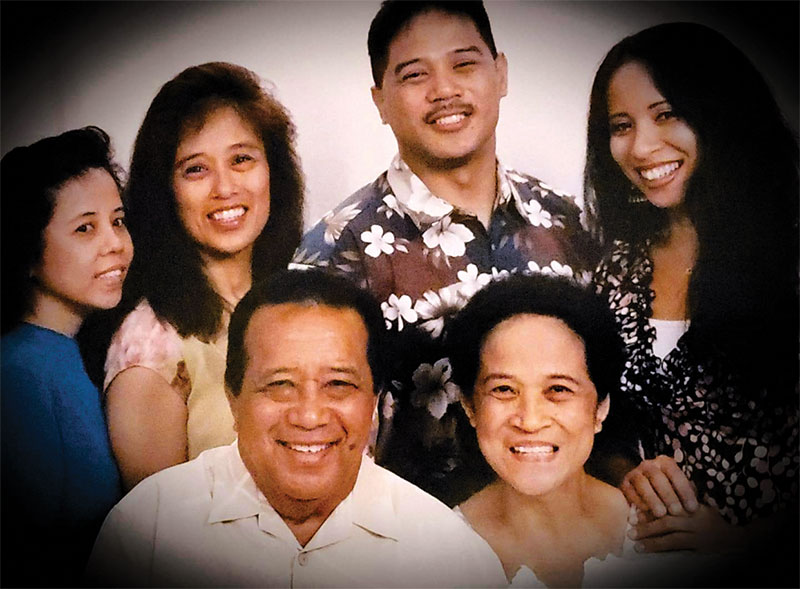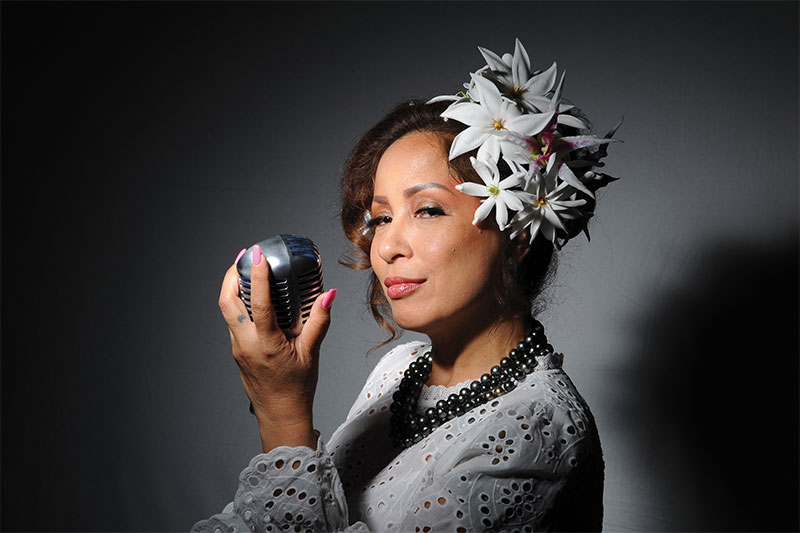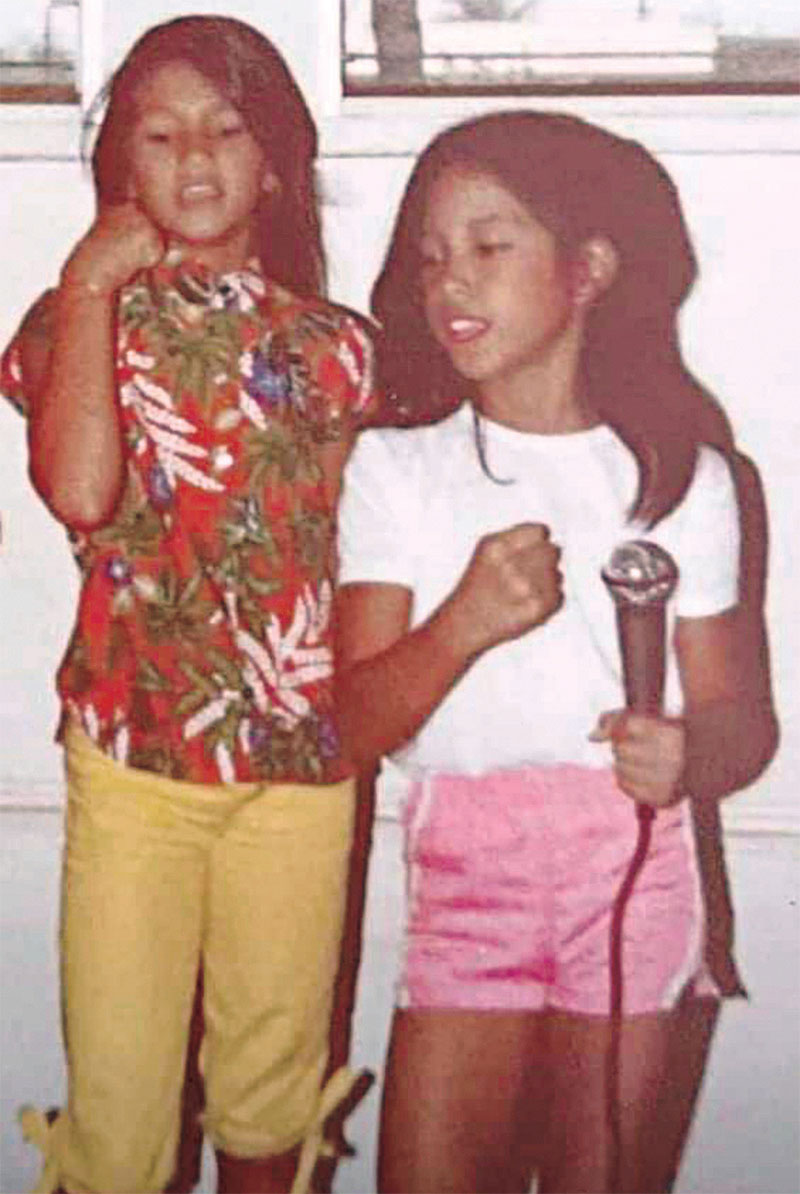Ready for the Spotlight
No longer holding back, Stacie Ku‘ulei prepares for the big time with the upcoming release of her “big girl” album — the singer’s first in nearly two decades.
As elegantly attired as Stacie Ku‘ulei often is these days, there was a time when the songbird wouldn’t be caught dead in a dress.
Consider the moment when her former vocal coach, the acclaimed Eunice DeMello, suggested she run for Miss Hawai‘i. With images of snug-fitting sequined outfits in mind, Ku‘ulei needed just two words to succinctly sum up her thoughts on the proposal.
“Um, no,” she answered matter-of-factly.
Putting on a garment of grandeur was frankly unconscionable to the self-professed tomboy, who as a youth preferred climbing trees and getting into her share of dust-ups over being in anything clean and exquisite. She was, after all, raised in the red dirt-packed village of Pākalā on Kaua‘i.

The Taniguchi ‘ohana: (clockwise from top) Shane, Stacie, Aurelia, Kazu, and sisters Melody and Shala.
“I didn’t see myself as a Miss Hawai‘i type because, to me, they were all very dainty,” Ku‘ulei explains. “Growing up, everybody would look at me and be like, ‘You’re always in T-shirts and jeans! Why aren’t you wearing more dresses?’
“Even when I was young, I hated the frilly ruffled socks and shiny shoes my mom would put on me, and so I’d end up throwing them off.”
Time eventually softened Ku‘ulei’s hard stance on dresses. She credits much of what she’s since learned about acceptable wardrobes and overall presentation to fellow vocalist Nohelani Cypriano.
“Nohe hired me to work on the Atlantis Navatek cruises years ago, and she really trained me to be an entertainer,” says Ku‘ulei. “Up until then, I was just a singer. But she took me aside and taught me what type of dresses to wear, how to put on my makeup, how to do my hair, and how to be a true mistress of ceremonies.”

Among the many to help Stacie Ku‘ulei with her new album were Louis “Moon” Kauakahi, left, and Horace Dudoit. PHOTOS COURTESY STACIE KU‘ULEI
The lessons learned then continue to show forth today, and in spectacular fashion. Not only is Ku‘ulei comfortable with her stylishness and the favorable impression she’s leaving with audiences, but she’s also content with the music she’s finally producing again.
Her eponymous album — which has been a year in the making — is scheduled to drop later this month. It will mark her first project released since 2003’s Stacie, which featured original reggae music.
“Actually, that one was more like naughty reggae done when I was young,” confesses a laughing Ku‘ulei. “This one will be my ‘big girl’ album.”
Her grown-up project features 10 contemporary Hawaiian and hapa haole tracks, including E ‘Apo Mai Kāua, a ballad about star-crossed lovers; and Rise Up E Ala E, a song written by Andra Day but repackaged “with a Hawaiian twist” courtesy of Kumu Keli‘i Puchalski, who helped the artist with the translation.

Stacie Ku‘ulei is a powerhouse singer who, although known for her contemporary Hawaiian music, is also comfortable singing R&B, pop, gospel and classical opera. LAWRENCE TABUDLO PHOTO
“I really wanted to do a song to recognize our kings and queens, or our first responders and essential workers,” explains the singer/songwriter, who is up for a Nā Hōkū Hanohano Award this year for her holiday-themed song Christmas Joy. “A good friend
of mine who’s a nurse at Kapi‘olani Medical Center had shared with me that when the pandemic first came out, she wasn’t able to go home to her kids, and it killed her that she could only see them from outside a window. I felt that, and I wanted to do something for her and others.”
As for E ‘Apo Mai Kāua, Ku‘ulei says the song was born out of her penchant for carefully watching others and honestly attempting to understand the complexities of their relationships.
“I’m a psych major, so I love to observe people and talk about their relationships and trials,” says Ku‘ulei, who recently returned to Tapa Bar at Hilton Hawaiian Village for Sunday evening performances and who continues to be a fill-in for Glenn Medeiros at the Hale Koa Hotel’s Lū‘au Show. “This song is more like Romeo and Juliet — two people who love each other so much but who can’t be together. I actually know people who are going through something similar, so that’s how the song came about.”
But what makes this hula-friendly album particularly special for her are the guiding hands behind it. They include well-known artists Horace Dudoit of Ho‘okena, former Mākaha Sons’ backbone Louis “Moon” Kauakahi — whom Ku‘ulei affectionately refers to as “Anakala (Uncle) Moonie”
— and producers Gerard Gonsalves and Aron Nelson. Even vocalist/guitarist Eric Lee makes an appearance on the track Mokihana Lullaby.
And while good friend and vocalist Natalie Ai Kamauu doesn’t appear on the album, she has been reserved for a special role.
“Natalie’s going to be dancing hula in one of my videos — so that’s a surprise,” gushes Ku‘ulei with excitement.
As much as it would appear that Ku‘ulei’s world revolves solely around music, the truth is that it doesn’t. On most fall, winter and spring days, she can be found teaching 7thgrade English at Kalākaua Middle School. She even remains busy during the summers, too, guiding students at Kamehameha Schools.
And although she’s had some experience at the elementary (“I taught third grade and it was the toughest year of my life because I cried every day”) and high school levels (“Some students started writing love letters to me, and when I complained to the principal about it, he laughed at me and said I was being ridiculous”), she soon came to the conclusion that middle school was “perfect” for her.
“I love doing what I do, which is teaching the kids,” admits Ku‘ulei, who received both her undergraduate and master’s degrees in teaching from Chaminade University. “My students inspire me, but they crack me up as well because they’re middle-schoolers. They’re sassy and they’re wise; they’re also puberty stricken, so every day is a new day with them.”
While the children remain her heart, singing has always been her passion — even though she had no aspirations of becoming a professional recording artist until the day DeMello told her “you have a voice that should be recorded.”
“I never really thought of singing as a career or something that I had to do to make money,” explains Ku‘ulei. “My mom used to say to me, ‘I know you love to sing, but you always need a backup plan. So maybe teaching would be good, and then who knows? Maybe when you move to Honolulu, you’ll get big?’”
Thinking back on her mom’s comments and how she’s been prepared for a life in the limelight, Ku‘ulei says, “It pretty much worked out the way she said it would.”
The youngest of four children born to Kazu and Aurelia Taniguchi, Ku‘ulei (her given middle name) was raised in a devout Christian household. Her father served as pastor of two churches — first at The Way of Salvation and later at Door of Faith in Kekaha — and chose to limit the type of music his children could listen to.
“We were a close-knit family, but my dad was strict. We couldn’t listen to the radio because he’d call it devil music,” laughs Ku‘ulei.
Despite that standard, music still flourished in the home.
“The weekends were all kanikapila,” she notes. “My entire family is musically inclined, so it’s basically anybody with the ‘ukulele and guitar. We’d even make music with spoons and buckets. And it was always, ‘Stacie, get up there and sing because Aunty wants to dance hula!’”
When she was 7, she composed her very first song. It would be the first of “1,001 songs I wrote in diary books and on folding paper.”
“It was probably done all in pidgin,” she recalls with a chuckle, “but I remember hearing my brother, who ran cross country, talking to my dad one day about how upset he was and how he thought he was going to be in the top three in this race. I remember saying, ‘It’s OK, Big Brother’ — that’s what I used to call him
— ‘you’ll do better next time.’ “When we got home, I started writing about him, about how he worked out every day running in the sand from Pākalā to Waimea and hoping that he was going to finish in the top three. And, of course, how sad he was when he didn’t.”
In many ways, Ku‘ulei owes much of her growth as a somewhat reserved performer turned powerhouse singer to her brother Shane, who passed away 16 years ago at age 38.
“I used to hold back a lot as a singer because people could be mean and sometimes come across as jealous, and they’d tell me, ‘All you want to do is show off!’ And that used to bother me,” she explains. “Then, one day, I remember my brother telling me, ‘Why you care about what people think? God gave you a gift, so just share it.’”
Following her brother’s death, Ku‘ulei insists she stopped listening to her naysayers and began dilating upon “giving it my all.”
For the dressed-for-success entertainer, being true to her heart is what matters the most.
Or as she succinctly puts it, “I’m not holding back anymore.”







